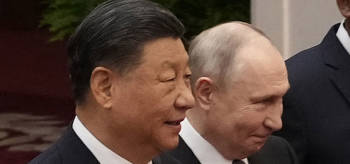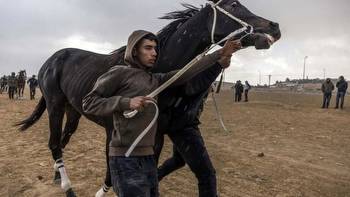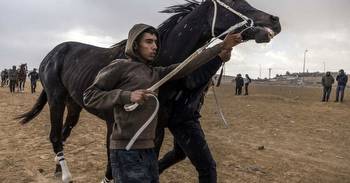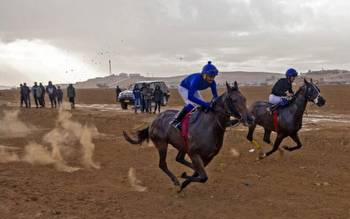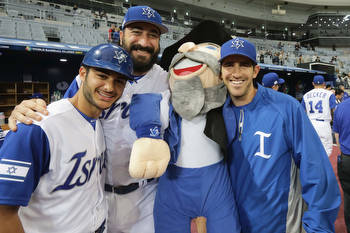Team Israel is a WBC underdog, but has a gameplan thanks to Jewish MLB staffers
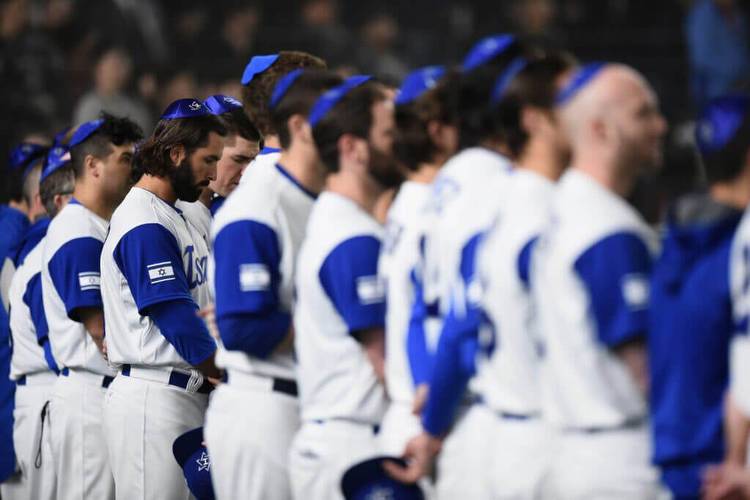
Five months ago, Chana Weinberg sent an email to veteran baseball scout Alex Jacobs.
A few years earlier, when Weinberg was a student and softball player at Yeshiva University in New York, Jacobs had spoken to her school’s baseball analytics club. The scout had a decade of experience in the game — with the Rays, Astros and Diamondbacks — but just as intriguing to Weinberg was his experience with baseball internationally. Since 2016, Jacobs has been intimately involved with the Israeli national baseball team, even serving as the team’s bench coach in the 2020 Olympics. After his chat with the club, Jacobs provided his contact info to the group, along with a directive: “Use it and abuse it.”
Weinberg graduated and, after failing to find a job in a baseball front office, moved to Israel, where scratching her baseball itch became difficult. It’s hard to watch games, and “not many 25-year-old women in Israel are down to chat about bWAR and fWAR and the difference between them,” she says. But then, with Team Israel preparing for a second run in the pandemic-delayed World Baseball Classic, she thought of Jacobs. She emailed asking if she could be of any help. Soon, she was on an email chain with Jacobs, Rays assistant director of player development Simon Rosenbaum and a collection of other Jewish executives and staffers across Major League Baseball.
“And me,” Weinberg says. “Which is insane!”
Over the past several months, and especially in the past few weeks, that collective of Jewish baseball staffers have been burning the midnight oil to help Team Israel prepare for the WBC. The task before them is gargantuan. Though Israel has enjoyed surprising baseball success in international play, thanks in large part to the participation of current and former Jewish big leaguers from the United States and Canada, this year they are a David in a bracket full of Goliaths. Team Israel is in Pool D, which also features Latin American juggernauts Venezuela, Puerto Rico and the Dominican Republic. The rosters of all three are stacked with big-league stars.
The Israel roster is not, although Israel boasts impressive credentials behind the scenes. Jacobs worked with MLB clubs for a decade, and Rosenbaum is seen by many as a future general manager. Beyond them, a host of others across the game — staffers and scouts with the Reds, A’s, Dodgers, Orioles, Nationals and Mariners, among others — have volunteered their time and effort to prepare scouting reports and other materials. Team Israel will shift with precision and have detailed plans of attack for hitters and pitchers.
All of those volunteering have day jobs, and March is one of the most hectic months on the baseball calendar. There are farm systems to run and players to scout and 162-game seasons for which to gear up. But these Jewish staffers have given what little downtime they have in order to ensure that Israel has the best chance of surviving what some might call the Pool of Death.
“We may not be the most talented team,” says Jacobs, “but we’re going to be the most prepared.”
If Team Israel passes such a difficult test, it will be because they studied for it. Hard.
It didn’t used to be this way.
Rosenbaum should know. Before he began a career in the Rays’ front office, he played for Team Israel. He first wore the blue and white in 2014. His last hurrah in uniform was in 2019, when he helped Israel qualify for the Olympics. When he started, there was no grassroots effort to prime the team with information. “There was no scouting, there was no advance reports,” Rosenbaum says. “Nobody was doing anything like that.” But the more Israel found success internationally, including a surprising run in the 2017 edition of the WBC, the more Jewish folks across baseball wanted to get involved. Some were players, like current Israel manager Ian Kinsler. More worked outside of the spotlight.
“There aren’t a lot of people with ties to Israel who play shortstop,” Rosenbaum says. “But there are a lot of people with ties to Israel who are on the front office side.”
Jacobs and Rosenbaum have made it their mission to tap as many of those resources as possible. Rarely do they have to go asking. Reds amateur scout Brandon Marr once found himself next to Jacobs at a Rookie League game. When Team Israel came up in conversation, Marr offered his services. This spring, he provided scouting reports on certain opposing players in his spare time. Matt de Marte, who runs his own analytics company after working for the Angels and the Lotte Giants of the Korean Baseball Organization, got involved after finding himself a nervous wreck during Israel’s successful run at the Olympic qualifiers. (His brother, Jonathan, was a pitcher on that team.) “I wanted to help out,” he says. In short order, he was put in contact with Jacobs.
Jacobs and Rosenbaum are “the tip of the umbrella,” as the former puts it, directing traffic and farming out tasks to anyone who is willing to chip in. They’ll take all comers, but they also want to provide opportunities that their fellow Jewish baseball-philes might not otherwise receive. For instance, A’s staffer Ed Gitlitz is doing advance scouting on Puerto Rico, a departure from his usual duties as the team’s director of minor league technology and development. “This is an opportunity to expand other people’s skill sets,” Jacobs says. If that opens avenues for advancement within the game, all the better.
No one appreciates that more than Weinberg, who is one of the few involved in the prep effort without any formal experience in the game. She was given the task of preparing scouting reports on Israel’s own players, to better help the coaching staff understand the roster’s strengths and weaknesses. Rosenbaum provided her with a spreadsheet full of data, which she has curated and color-coded for ease of understanding. (One intentional design choice: placing strikeout and walk rate ahead of batting average.) Early on, she emailed some ideas to Rosenbaum, only to feel an immediate pang of imposter syndrome. Within a minute, Rosenbaum responded with fire emojis and praise.
“I was floored,” she says. “Like, ‘What? I can do this?'”
After moving to Israel, she’d largely given up on her dream of working in baseball. Now it simmers again.
Israel has studied for the exam. The test will begin Sunday, when they take on Nicaragua.
Of all Israel’s opponents in Pool D, Nicaragua is both the most beatable and hardest to scout. Most of the players on the Venezuelan, Puerto Rican and Dominican squads have long track records in the majors or the affiliated minors, and detailed data on them are available to anyone with access to FanGraphs or Baseball Savant. (“It’s not that difficult to find a ton of public information on Juan Soto,” notes de Marte.) But few Nicaraguan players have made the leap to the minor leagues, much less MLB, which means Israel’s collective of evaluators must hunt for information wherever they can find it. Jacobs has reserved much of that responsibility for himself. “Nicaragua is my baby,” he says. Nicaragua is Israel’s first opponent and starting pool play with a win, he adds, might as well be Israel’s Super Bowl.
There will be reams of information on the other three teams in Israel’s pool. Literally. No electronics are allowed in the dugout in the WBC, which means all the information Israel has collected — currently living in a Google Drive shared by the scouts, analysts and coaches — will have to be printed and organized for quick reference mid-game. There will be a lot to distill. There will be page-length reports on each hitter and pitcher Israel will face. Sam Berk, a baseball operations fellow with the Orioles, has worked up reports on every catcher. Dodgers international scout Matt Doppelt is doing pitcher attack plans. Someone else has focused purely on the running game. Unlike in MLB this year, shifts are allowed, and de Marte says Israel will have “some really solid defensive positioning work.” He also has worked up hitter-pitcher projections, with each potential matchup graded by projected wOBA.
Then, they will turn it all over to Kinsler, the former big-league infielder who is managing for the first time. (Brad Ausmus, who once managed Kinsler, will serve as his bench coach and, as Kinsler puts it, “comfort blanket.”) Kinsler describes his style as “old school” and likes the idea of “managing with your gut,” but he also knows the value of good information. “The numbers have never played the game,” he says, but he also acknowledges that “you never know when there’s a piece of information that might help you win.” It’s crucial to know the tendencies of opposing hitters and pitchers, for example, and he appreciates that so many have worked to provide it. “It’s really flattering, honestly, the people who want to input some time and effort in helping us succeed,” he says.
Once games start, the men and women behind Team Israel will have to content themselves to sit back and watch. Gitlitz is counting on games being on TV around Oakland’s minor-league complex, and Marr is planning to have his phone fully charged so he can watch as he scouts amateurs in the Pacific Northwest. Weinberg will be traveling to Miami from Israel to attend the games. Jacobs and Rosenbaum also will be in attendance; Rosenbaum is listed on the roster as a coach.
Their work is mostly done, or at least as done as it can be. A lot of weird and unpredictable things can happen in four games against four different opponents — strikeout-prone players can draw walks and slap-hitters can crack homers — but that doesn’t make Israel’s prep work any less valuable. “What’s going to be best over a 162-game season,” says Rosenbaum, “is pretty similar to what’s going to be best over just one nine-inning game.” And some small-sample weirdness is perfectly fine if it’s to Israel’s benefit. By talent, Israel would at best be projected to go 1-3 in its pool. Beating the odds is exactly what they hope to do anyway.
And if some tiny but vital piece of information surfaces once play begins? “There’s still,” de Marte says, “good ol’ pen and paper.”
